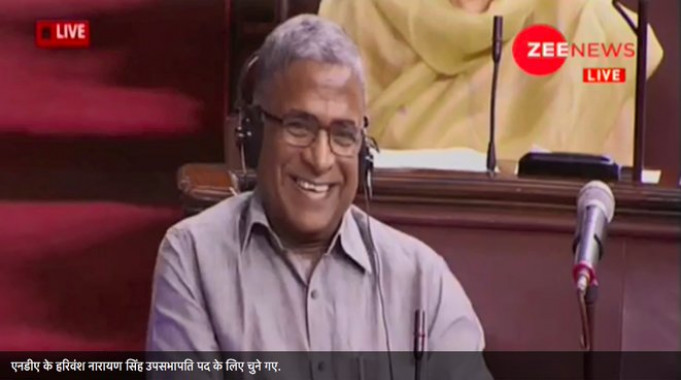“I thought I was moving to a platform where you can raise issues”
The former journalist who has just become Deputy Chairman of the Rajya Sabha explained earlier this year why he decided to shift from journalism to politics.
Because, “whatever great journalism you do, the system does not change”. His paper exposed several scams, including the fodder scam. It did great investigative journalism, but there was no systemic change.
Now, he said, he was discovering that you cannot change things through Parliament either. “I thought I was moving to a platform where you can raise issues. I raise an issue in Parliament, but eventually nothing happens… I thought it was a forum where serious issues could be raised but there has been no business transacted over the past week.”
In December last year he wrote in an article which he titled “Does this Parliament listen our voice?” also published here, “I entered this House with a dream to debate issues pertinent to our country.
"Joblessness or the era of jobless growth is the biggest challenge that the country is facing today. Since globalisation itself faces serious contestations, I often ask myself whether our economic growth model has failed. I am eager to hear the enlightened debates/views of this House in the same spirit that I heard the debate on the GST Bill, in my view one of the best debates in RS so far – it debate was marked by eloquence, knowledge and full participation of members, above party lines and narrow partisan politics, keeping in view the interest and future of the country.
“I have been asking myself why a silent member like me (and there are many silent members in all parties in RS who adhere to rules and procedures and completely respect the words and instructions of the Chair) remains unheard. How do we, who do not rush to the well of the House, navigate through this crisis, restore our faith in the great parliamentary traditions of this country?”
It is unlikely that he imagined then or when I spoke to him in March this year that a few months down the line he would soon be in a position to steer the proceedings. But he is now, and the rule-abiding silent member has a challenge ahead.
During his innings at Prabhat Khabar in Ranchi Harivansh was a far more rural development-oriented editor than most. Before the Janata Dal (United) in Bihar surprised him with the offer of a Rajya Sabha seat he had a long innings there, both before and after the new state of Jharkhand was created.
On the day in 2000 when the new state was born, Prabhat Khabar published a 76-page special edition. It was Birsa Munda’s birth anniversary, and the paper carried the legendry tribal leader’s agenda for Jharkhand, an article by anthropologist Kumar Suresh Singh, and several other special articles. Thereafter it became a hallmark of his stewardship that a think tank would be commissioned to do annual surveys of how the state was faring on various indices, which the paper carried.
Along with other claimants in Bihar, he has been a pioneer of newspaper localization, telling The Hoot in 2002 that the paper had to be extremely local in its reporting if the media was to be an agent of change at the grassroots. It had stringers in 70 out of the 114 blocks in the state, 30 per cent of them adivasis. He learnt from other success stories in the country that you win over a readership by focussing on issues which affect people’s lives.
When he took over this newspaper the paper was published from Ranchi and had a circulation of 500. Then it expanded to have editions in Patna, Jamshedpur, Dhanbad and Calcutta as well, and an Internet edition. Early on he visited the Malayala Manorama, the Maharashtra Times, Eenadu, and Nai Duniya and studied them, and then formulated his publishing strategy.
But as the recent reporting on him in the media has said, he is best known as the editor of the newspaper which broke the fodder scam which has brought the state of Bihar worldwide notoriety. The Rs 700 crore scam first began to be reported by Prabhat Khabar in 1992. The first FIR in this case had been filed by the state vigilance department in 1990. As Harivansh has said to The Hoot earlier, every body in the city knew about the scale of loot, and once the paper started writing about it people would walk in to give information.
Prabhat Khabar went on to carry some 70 reports, publishing documents, and waging a sustained campaign despite threats and pressures. It had four or five reporters working on the story. But for all that, as he says now, systemic change is not going to come because of journalism. Will it come through politics?
There is euphoria in the ruling party over his comfortable victory but the former editor who wants to be a change agent is personally up against the realities of a career in politics. Including the fact that though he was an idealist who dropped his caste name long ago, he is now is being described by it in the reporting on the House election.
Sevanti Ninan edits The Hoot







